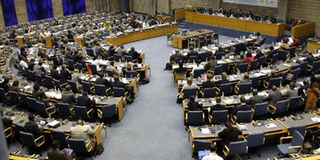Sweden supports UN reform to boost its effectiveness

Delegates at a UNEP meeting in Gigiri complex, Nairobi.
Nairobi is the first and only United Nations capital in the global south. The United Nations Environment Program (Unep) was founded as a result of the United Nation’s Conference on Human Environment in Stockholm in 1972.
Kenya offered to host the newborn organisation and 50 years later the UN compound is bustling as staff from several UN organisations are transferred to Nairobi.
The UN is currently being challenged on all fronts. This week, all ambassadors representing Sweden at the different UN organisations around the world have travelled to Nairobi. We meet here to assess, analyse and discuss the current state of the UN system.
Mid-sized countries like Kenya and Sweden must defend the UN and the rules-based world order, as this is our best guarantee for peace and prosperity. In particular, we need a more effective and representative Security Council that can fulfil its primary responsibility of maintaining international peace and security. Sweden continues to be a vocal supporter of an increased representation from the African continent on the Council.
In these challenging times, Sweden remains a steadfast and reliable partner in peace-building, humanitarian aid and human rights. We are one of five countries in the world that still maintains an overseas development aid of more than 0.7 per cent of our GDP. We pride ourselves on providing core support to many of the UN’s development organisations.
We are, for example, UNHCR’s third-largest and UNDP’s fifth-largest core donor. Core support allows the UN organisations to innovate, direct their work to where the need is and to quickly respond to upcoming emergencies.
Champion
Sweden is a champion for reforming the UN development system to be more effective and efficient in delivering impact and results at the country level. The UN system in Kenya is at the forefront of these reforms, as it is streamlining its programming and operations as One UN. Sweden supports these efforts with $18.3 million, and we are proud to be part of a process that delivers tangible and meaningful development results in Kenya, such as an innovative approach to bring sexual and reproductive health care to the youth through technology.
Like the UN Secretary-General Antonio Gutierrez, we see a strong need for continuous reform to keep the UN fit to provide global solutions to global challenges. In times of drastically shrinking resources every dollar needs to be used effectively to the benefit of the societies and people the UN aims to serve.
Deadly violence
Half of the world’s population is female. While our two nations recognise women’s equal value and rights in our respective constitutions, women and girls in Kenya still struggle to take their rightful place in society. Lately, a surge in deadly violence against women has limited their horizons even further. In 2025, Sweden chairs the board of UN Women and we are pushing for efficiency and transparency so that every available dollar can go to improving women’s political, social and economic status as well as their inherent right to decide over their own bodies.
As Kenya knows far too well, peace does not just happen. Talking about peace is easy. Preventing conflict or rebuilding societies takes commitment. Kenyans and Swedes have served together in UN peacekeeping missions both in Europe and in Africa. Sweden is a strong voice in the UN Peacebuilding Commission in New York. But we also walk the talk. Norway and Sweden financed the last Peacebuilding Architecture Review in Kenya.
We hope the outcome of this joint investment will play a key role in preventing violence up to and around the 2027 elections. As always, the UN can assist, but it is up to every government to take responsibility for its own people and their well-being.
Ms Vicini is the Swedish Ambassador to Kenya while Ms Janse is a State Secretary.


